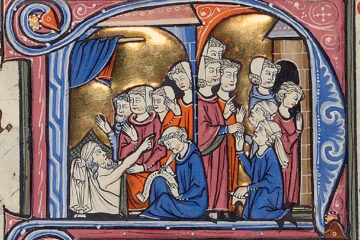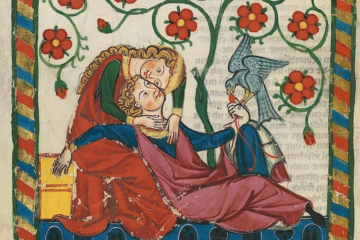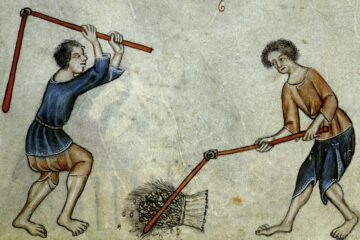by His Holiness, Pope Alexander I
Chapter I: “The Early Ages”
Today the Empire is large and prosperous, however, things were not always so. We see the time before the Sirius Empire as the Early ages, a time where the rest of Europe did not know about its might. Back in days long past around the years 700-800, Europe was nothing more than a vast playing field for petty kings and barbarian peoples squabbling over minor pieces of land. With time, civilizations began to form from the ashes of the dead Roman Imperium and pose a serious threat to the tribal societies which lived in Europe at the time. In reaction to this, His Holiness Pope Leo III on the 800th winter since the birth of Christ proclaimed the Frankish king Charlemagne Emperor of the newly formed Holy Roman Empire.
Instead of stepping aside and granting all of this power to the Emperor, the other nations of the time rose up in what was to be known as the “War for the Holy Crown”. The newly formed HRE faced internal rebellions as well as outside invasions from different countries seeking to claim the Imperial Crown. Charlemagne’s realm was powerful and it claimed all the land from the coasts of Bordeaux to the pagan Slavonia. In the next 20 years, the HRE would stock up and ready itself for war. The goal was to secure Iberia and drive out the growing Muslim threat from Europe, with this Casus Belli, the HRE gained support from many of its previous enemies. On the 24th of April in the year 825, the HRE called its banners and rode south to repel the heathen threat. In the shadows, while the Emperor was campaigning in Iberia, he left the administration of his Empire in the hands of the capable Grand Duke Hendry II “the Usurper”. His title was well earned as he, whilst the Emperor was away, plotted a coup d’etat together with Wilhelm I “Son of Rostnag”. It was only 2 years after the beginning of the “War of the first European Coalition” that Grand Duke Hendry proclaimed himself as sovereign of the Holy Roman Empire while giving most of Germania Minor to the tribals in exchange for their support. Furious about the betrayal, Emperor Charlemagne was forced into signing a temporary peace with the Muslims, and later rode to Rome to gather his forces to take back his throne. By this point the year was 828 and the HRE was split into North and South. On the 4th day of the 3rd month in the year 828, the self-proclaimed Emperor Hendry II marched on Rome with his army of 40,000 assisted by another 15.000 tribals from Germania. His words were:
“The Holy Roman Empire is neither Holy nor Roman nor an Empire without its capital Rome, so we shall seize it!”
Historia Caroli Magni
Hearing of his march on Rome Emperor Charlemagne called all those who followed the word of God and all those who saw him as Emperor into war against the Usurper. Together with his forces from Iberia and his allies he had just short of 30.000 men at his disposal. The Pope would later grant him 5.000 of his guard in order to “protect all of Christendom against the cursed Usurper who would side with Pagans”. The siege of Rome lasted for half a year before word reached both the attacking and defending side. In the letter to Emperor Charlemagne it said:
“Your Imperial Majesty, the good lords of your empire have forsaken you and sided with the traitorous Usurper, and for this, you have our grandest apologies. I would bend my knee if I could, however, there is a new danger on the horizon. The pagan savages of the East have gathered and have laid siege to Paris, and with all our armies gone, all the defenses we had were crushed by the 20.000 or so barbarians. Our soldiers will lay their arms down and assist you in the march for Paris. Please ride with haste, let this world not see the fall of a second Roman Empire.
Historia Caroli Magni
Your faithful vassal,
Horrified by the news of a Paris under siege, the brave Emperor marched his 35.000 men right into the besieger’s camp. The Usurper’s army was just out of battle against the tribals who were there to assist them, of his men remained 35.000. The Usurper held a tactical position opposite his opponent, however, 25.000 of his troops joined the Emperor’s side, claiming that the safety of Paris was more important than a fight over any throne. Despite having the opportunity to retreat Lord Hendry ordered his men forward and led the charge himself. He was killed almost instantly by riding into a defensive spear formation. 2.500 of his men died in the battle, 2.500 were injured and the remaining 5.000 either fled or joined the Emperor.
And so Charlemagne arrived at the barbarian’s encampment after 30 days of riding with the force of about 65.000 men, in opposition to the enemy’s 30.000. His tactical prowess won him the battle, ordering 2/5 of his force to flank the barbarians who were weak at the rear, completely disorienting and crushing their army in what was to be known as the “Battle for Paris”. Almost all of the barbarians were taken captive, mostly as slaves, including their leader Wilhelm I “Son of Rostnag”, whose father died in the battle. Using him as a bargaining chip, Charlemagne was able to negotiate for the return of the Empire’s land. All of the Germanic captives were released from captivity, except Willhelm, who would die in the dungeons of Paris 5 years later. His last words are thought to be:
“You will regret the day you made an enemy of the German people, Charlemagne!”
Unknown
Every lord who swore fealty to the Emperor was spared execution, and Lord Arian was pronounced Advisor to the Emperor, for his service to the Empire. Just as things calmed down the first Emperor of the Holy Roman Empire met his demise in the same year. This wouldn’t have been a problem if his Oldest son and Heir, hadn’t rejected his father’s titles and left the realm. This opened up an opportunity for the other sons, as they all saw their father’s Empire as their birthright. His sons Luis, Carloman and Pepin all raised their banners and fought for the Crown in what was to be known as the “War of the Three Sons”. The war raged for 5 years until a white peace was signed. The first two brothers had survived, while the third died in battle, leaving his kingdom to fall into the hands of Saxon and Germanic invasion. The two remaining brothers agreed to split the empire into North and South, one French one Italian. Although Charlemagne knew the importance of teaching his sons from an early age, they still failed to see what they were doing was mirroring the Fall of Rome, by splitting their Empire into two parts. For 10 years the Empire existed in unstable peace until the Slavic and Germanic tribes formed a federation and attacked the Southern Empire. Knowing they hadn’t the men, Carloman “the Beggar” begged his brother for aid in the upcoming “War of the Slavic Reconquest of Dalmatia”. He was denied help and left to fend off the approaching 45.000 warriors with 20.000 of his own men. The ensuing war was nothing to the Slavic tribes, as they easily defeated the Italians in the “Battle for Zagreb” and continued onward facing minor resistance until they reached Rome. Furious that the French Emperor refused to help defend the Holy City, the Pope excommunicated Emperor Luis I “the Damned” removing him from the Christian faith.
The Siege of Rome lasted for a bit more than one year, before General Vuk “the Serb” managed to breach the walls of the city and pillage it. The Sack of Rome lasted for an entire fortnight, it resulted in the loss of Croatia and parts of Italy, now the newly formed Kingdom of Rashka bordered Venice and stretched from the capital of Belgrade. What followed were days of hardship for the Italian Empire, which ended in the murder of Emperor Carloman and the dissolution of the Southern Empire. What followed were years of chaos, and in the midst of it was Lord Darius, who was exiled from the Empire after Charlemagne’s death. He worked undercover and established a rebel group known as “Bona Fide” which aimed to restore the Holy Roman Empire to its former glory. At this point the HRE wasn’t in possession of vast quantities of its land, including Germania, which split into tribal principalities, most of them being united by Tolfdir “Son of Willhelm”, Germania minor, which was being destroyed by the growing Slavic kingdom and Italy which was now a peninsula of warring states fighting for control over the Holy City. The only parts that remained were those of Frankia. Lord Adrian requested an audience with the Emperor, claiming he knew of a weakness in the neighboring barbarian cities, while under the alias of “The Good Dog”. The setting could not have been better, he was granted the audience and was to meet the Emperor tomorrow. Preparations were made, the guards were paid off, some even joined the rebellion. The next day on March 22nd 852 the Emperor would see his end. He was cornered in the throne room, with his last words being:
“The good dog? That’s all you were to my father, just a DOG TO DO HIS BIDDING!!!”
Unknown
After the assassination, Lord Adrian proclaimed himself Emperor of the Holy Roman Empire and King of Latinum. His reign was cut short due to the chaos the Empire was left in. After ending a revolt by ordering his men to kill civilians, the country rose up and overthrew him. And so without any successors and without anyone to claim the Holy Crown, the HRE shattered into a dozen or so duchies and Europe found itself in an even worse position than 60 years ago. So ended the reign of Adrian I “the Good Dog” Emperor of the Holy Roman Empire and King of Latinum, after he ordered the murder of 5.000 of his own countrymen. The following 60 years knew only war and conquest. From the ashes of the HRE petty kingdoms were born. The beginning of the X century was marked by Viking invasion across Britannia and what was left of Frankia. On the isolated island of Britannia, king of Wessex Edward “the Elder” was crowned “King of the Anglo-Saxons” in order to unify the Kingdoms of Britannia under one flag and united stand against the pagan invaders. In the 911th year, the Viking Rollo “the Conqueror” occupied most of Northern France, including Paris. During the assault on France, every army was crushed by the Viking warriors, who seemed like Gods compared to other men. They took men, women, and children as slaves, and burned most of the countryside. They would use Njarovik as their makeshift capital in France, while Paris was burned to the ground, and renamed Byenfaldatya, which would translate into “The city that fell”. These conquests of Europe were made possible by Rollo’s brother Ragnar Lothbrok, who was able to navigate the sea in such a manner that he uncovered Europe to the savage pagans. While Rollo was a warrior at heart, his brother was more cunning, while still being able to best any man in single combat. The two kings, Edward and Ragnar, formed a rather unusual friendship, instead of conquering Britannia, Ragnar offered his men to aid Edward in his goal to unify all of Britannia and proclaim himself as the rightful monarch of the island. They were successful, and in 912 Edward I “the Elder” was crowned King of England and the Highlands. He reformed the administration and army of his new kingdom as well as changing the flag into a single red cross on a white banner and shifting his efforts into making a better capital for his new Kingdom. He decided to invest heavily into the rapid construction of London, an old Roman town. Untrusted reports say that Kings Edward and Ragnar would often meet and discuss the differences between their civilizations and even their Gods. It is said that the Viking Ragnar was even baptized, although I dismiss these claims as children’s tales. King Edward’s intentions were unclear to all of the great lords of Europe, until the “London Wedding”. This was to be a wedding to unify the Anglo-Saxons and Vikings into a permanent alliance. What was supposed to be a happy celebration turned into a massacre. All of the Viking nobles were slaughtered in the great hall, whilst they were dining, including Ragnar, all of his sons, his Queen even the shield-maiden Lagertha. Accounts report that Edward did not want this to happen and quietly wept through the whole ordeal while maintaining his appearance. It is said that Ragnar forgave King Edward in his final words. While this was happening in the great hall, all of the 10.000 Viking warriors laid on the ground, their ale was poisoned by the “Tears of Maria” a clear odorless poison. This marked the end of the Early Ages and the beginning of the next age.


